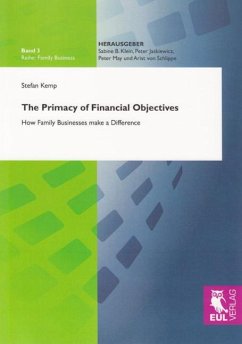The pursuit of financial profit has always been, and will continue to be, the core concern for private sector organisations. There has been an unquestioning acceptance that the maximisation of financial return is the primary driver for all private sector firms regardless of the nature of these firms. This book challenges the simplicity of that assumption. Using empirical research undertaken in a variety of private sector organisations in Germany this book demonstrates that there are differences which reflect the nature of the firm in question. The research compares family and non-family firms and finds significant variations in organisational objectives. The priorities, structure and financial drivers of family firms differ markedly from those of non family firms and, unsurprisingly, strongly reflect the family influence. Yet, the dominant paradigm in current management thinking is centred on public limited companies (PLC) managed by professionals and overseen by a Board of Directors representing the interests of a large number of shareholders. Even here the evidence is that the achievement of maximum return on invested capital is not necessarily the first and only priority. In western economies family firms have significant macroeconomic importance. Taking a differentiated view on private sector organisations matters to practitioners and politicians who must ensure their decisions are being made on the right premises. Researchers may feel invited to interdisciplinary research initiatives that integrate findings from family business research and other academic fields.
Hinweis: Dieser Artikel kann nur an eine deutsche Lieferadresse ausgeliefert werden.
Hinweis: Dieser Artikel kann nur an eine deutsche Lieferadresse ausgeliefert werden.








